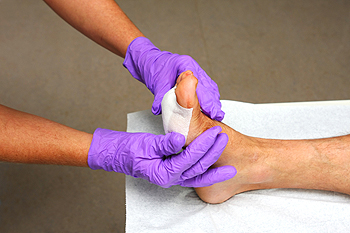
Debridement is the process of removing dead or infected tissue from foot wounds or ulcers to help the body restart the healing process. When unhealthy tissue is present, it can delay healing and increase the risk of infection. By clearing out this tissue, debridement encourages the growth of healthy skin, reduces the chance of complications, and may minimize long-term scarring. There are several types of debridement, including enzymatic, autolytic, mechanical, and sharp methods. The method chosen often depends on the severity and condition of the wound, as well as a patient’s overall health. In some cases, surgery may be required, particularly for deep or severely infected wounds that do not respond to conservative options. A podiatrist can evaluate the wound and determine the most effective way to promote healing. Podiatrists are trained to manage foot, toe, and ankle wounds safely and effectively, and they provide continued monitoring throughout recovery to help prevent further issues. If you have foot wounds or ulcers that are not healing properly, it is suggested that you schedule an appointment with a podiatrist for an exam and ongoing wound care.
Wound care is an important part in dealing with diabetes. If you have diabetes and a foot wound or would like more information about wound care for diabetics, consult with one of our podiatrists from Metro Foot & Ankle. Our doctors will assess your condition and provide you with quality foot and ankle treatment.
What Is Wound Care?
Wound care is the practice of taking proper care of a wound. This can range from the smallest to the largest of wounds. While everyone can benefit from proper wound care, it is much more important for diabetics. Diabetics often suffer from poor blood circulation which causes wounds to heal much slower than they would in a non-diabetic.
What Is the Importance of Wound Care?
While it may not seem apparent with small ulcers on the foot, for diabetics, any size ulcer can become infected. Diabetics often also suffer from neuropathy, or nerve loss. This means they might not even feel when they have an ulcer on their foot. If the wound becomes severely infected, amputation may be necessary. Therefore, it is of the upmost importance to properly care for any and all foot wounds.
How to Care for Wounds
The best way to care for foot wounds is to prevent them. For diabetics, this means daily inspections of the feet for any signs of abnormalities or ulcers. It is also recommended to see a podiatrist several times a year for a foot inspection. If you do have an ulcer, run the wound under water to clear dirt from the wound; then apply antibiotic ointment to the wound and cover with a bandage. Bandages should be changed daily and keeping pressure off the wound is smart. It is advised to see a podiatrist, who can keep an eye on it.
If you have any questions, please feel free to contact our office located in Tempe, AZ . We offer the newest diagnostic and treatment technologies for all your foot care needs.
